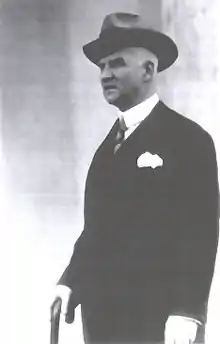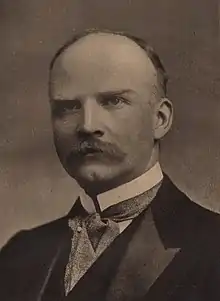
Emil Szymon Młynarski (Polish pronunciation: [ˈɛmil ˈʂɨmɔn mwɨˈnarskʲi]; 18 July 1870 – 5 April 1935) was a Polish conductor, violinist, composer, and pedagogue.
Life
Młynarski was born in Kibarty (Kybartai), Russian Empire, now in Lithuania. He studied violin with Leopold Auer and composition with Anatoly Lyadov and Nikolai Rimsky-Korsakov. He was the founding conductor of the Warsaw Philharmonic Orchestra and subsequently served as principal conductor of the Scottish Orchestra in Glasgow from 1910 to 1916. He conducted the premiere of Karol Szymanowski's opera King Roger.
He composed, among other things, a symphony dedicated to his homeland (Symphony in F major, Op. 14, Polonia), and two violin concertos (1897, 1917). The latter concerto, in D major, Op. 16, has been recorded by Konstanty Kulka and Nigel Kennedy.
Emil Młynarski died in Warsaw at age 64. His daughter Wanda married Wiktor Łabuński. His daughter Aniela (Nela, Nelly) married Mieczysław Munz and later Arthur Rubinstein. He is the grandfather of John Rubinstein and the great-grandfather of Michael Weston, both American actors. He is closely related to the famous Polish poet and singer Wojciech Młynarski (1941–2017) and his daughter Agata Młynarska (born 1965), a Polish celebrity TV journalist.
Among his students were Pyotr Stolyarsky (the teacher of David Oistrakh), Paul Kochanski, Alexander Zhitomirsky,[1] Paul Kletzki, and Wiktor Łabuński.
Selected works

Sortable list of compositions categorized by genre, opus number, date of composition, titles, and scoring
| Genre | Opus | Date | Polish title (Original title) | English title | Scoring | Notes |
|---|---|---|---|---|---|---|
| Piano | 1 | Kartka z albumu | Album Leaf (Feuille d'album) | for piano | ||
| Piano | 3 | Romans | Romance (Romanza) | for piano | ||
| Chamber music | 4 | 1892–1893 | Trzy utwory
| 3 Pieces (Trois morceaux)
| for violin (or cello) and piano | published 1892 |
| Piano | 5 | Trzy utwory
| 3 Pieces (Trois morceaux)
| for piano | ||
| Chamber music | 6 | 1893 | Trzy utwory
| 3 Pieces (Trois morceaux)
| for violin and piano | |
| Chamber music | 7 | Dwa mazury
| 2 Mazurkas (2 Mazurs)
| for violin and piano | ||
| Vocal | Schlaf ein | for voice and piano | published 1892; words by August Heinrich Hoffmann von Fallersleben | |||
| Vocal | Ambrosische Nacht E-dur | for voice and piano | ||||
| Piano | before 1895 | Sonata na fortepian | Sonata | for piano | ||
| Concertante | 11 | c.1897 | Koncert skrzypcowy d-moll | Concerto in D minor | for violin and orchestra | published 1899; dedicated to Leopold Auer |
| Stage | c.1898 | Ligia | Ligia | Opera after Henryk Sienkiewicz's Quo vadis; unfinished | ||
| Stage | c.1900 | In vino veritas | In vino veritas | Opera; unfinished | ||
| Orchestral | 14 | 1910 | Symfonia F-dur "Polonia" | Symphony in F major "Polonia" | for orchestra | published 1911 |
| Stage | 1913 | Noc letnia | Summer Night | Opera | ||
| Vocal | c.1915 | Orły do lotu | Fly Up, Eagles | for voice and orchestra | ||
| Concertante | 16 | c.1916 | Koncert skrzypcowy D-dur | Concerto in D major | for violin and orchestra | |
| Choral | c.1916 | Ej chłopie polski | Hey, the Polish Peasant | Cantata-Ballade | ||
| Orchestral | Melodie dawniejsze | Old Melodies' | for orchestra | |||
| Vocal | Piosenka o Komendancie | Song of the Commander | for voice and piano | |||
| Vocal | 1924 | Pasterz do Zosi | The Shepherd and Zosia | for voice and piano | words by Kazimierz Brodziński | |
| Orchestral | 1925 | Fanfary uroczyste | Solemn Fanfares | for orchestra | ||
| Orchestral | Kołysanka | Lullaby | for orchestra |
See also
References
- ↑ Alexander Zhitomirsky (Александер Матвеевич Житомирский) (1881-1937)
External links
- Works by or about Emil Młynarski at Internet Archive
- Free scores by Emil Młynarski at the International Music Score Library Project (IMSLP)
- Scores by Emil Młynarski in digital library Polona